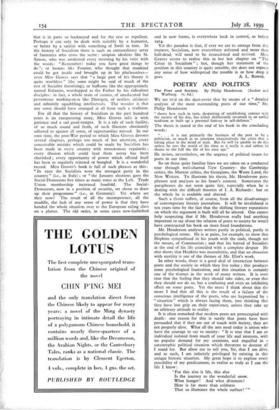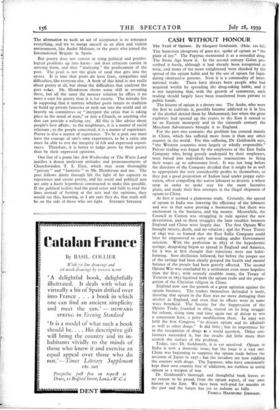POETRY AND POLITICS
WE are mod on the dust-cover that by means of a "detailed analysis of the most outstanding poets of our time," Mr.
Philip Henderson "shows how each in turn, despairing of establishing contact with the society of his day, has either deliberately returned to an earlier tradition or built up a personal fantasy in self-defence."
The thesis is stated at the end of his book in the concluding words :
" . it is not primarily the business of the poet to be a
politician, so much as to interpret imaginatively the crisis that is taking place in the mind of man. But he will be unable to do this unless he sees the world of his time as it really is and unless he shares to the full the life of his own age."
He insists, nevertheless, on the urgency of political issues for poets in our time.
So on these quite familiar lines we are taken on a conducted tour through well-charted New Country : the Cambridge critics, the Marxist critics, the Georgians, the Waste Land, the New Writers. To illustrate his thesis, Mr. Henderson para- phrases and analyses to his heart's content. Sometimes the paraphrases do not seem quite fair, especially when he is dealing with the difficult theories of I. A. Richards : but on the whole he is readable and shrewd.
Such a thesis suffers, of course, from all the disadvantages of contemporary literary journalism. It will be invalidated in ten years time by the fact that the shifting literary reputations on which the argument is built will all be altered. One cannot help suspecting that if Mr. Henderson really had anything important to say about the relation of poets to society he would have constructed his book on more fixed foundations.
Mr. Henderson analyses writers partly in political, partly in psychological terms. He is at pains, for example, to show that Hopkins sympathised in his youth with the ends, though not the means, of Communists ; and that his hatred of Socialists at the end of his life coincided with a complete despair He also shows that Hopkins was masochistic, and that an obsession with sterility is one of the themes of Mr. F,liot's work.
In other words, there is a good deal of interaction between poets and the society in which they live today ; this produces some psychological frustration, and this situation is certainly one of the themes in the work of many writers. It is even true that the feeling that they should take sides, or even that they should not do so, has a confusing and even an inhibiting effect on some poets. Yet the more I think about this the more I find that all this is the result of a failure of the conscious intelligence of the poets, who are hypnotised by a " situation " which is always facing them, into thinking that they have lost grip on their experience, unless they take up an arbitrary attitude to reality.
It is often remarked that modem poets are preoccupied with death : one reason for this is surely that poets have been persuaded that if they are out of touch with sbciety, they are not properly alive. What all the arts need today is artists who have the courage to say to society : "It is true that I am an individual isolated from much of your life and interests, with no popular demand for my creations, and engulfed in a catastrophic political situation which threatens to destroy all I stand for. But allow me to tell you, Sir, that I am "alive, and as such, I am infinitely privileged by existing in this unique historic situation. My great hope is to explore every possibility of my predicament, to realise as truly as I can the life I know : 'For this also is life, this also Is the journey to the wonderful snow. What hunger! And what distances! Here is far more than coldness That so illumines the whole surface! ' " The alternative to such an act of acceptance is to renounce everything, and try to merge oneself in an alien and violent environment, like Andre Malraux, or the poets who joined the International Brigade in Spain.
But poetry does not consist in tying political and psycho- logical problems up into knots : nor does criticism consist in untying them, and thus " analysing " the predicament of the poet. The pearl is not the grain of sand that gets into the oyster. It is true that poets do have fears, sympathies and difficulties, like everyone else. A book of this kind is not really about poetry at all, but about the difficulties that confront the poet today. Mr. Henderson shows some skill in revealing these, but all the same the mousey solution he offers is no more a cure for poetry than it is for society. The mistake lies in supposing that it matters whether poets return to tradition or build up private fantasies or rush out into the world and sit bravely on committees or "interpret the crisis that is taking place in the mind of man," or join a Church, or anything else that can provide a rallying cry. All this is like advice about people's love affairs : to the neighbours, it is a matter of social relations ; to the people concerned, it is a matter of experience. Poetry is also a matter of experience. To be a poet one must have the courage of one's own experiences, to be a critic one must be able to test the integrity of felt and expressed experi- ences. Therefore, it is better to judge poets by their poetry than by their expressed opinions.
One line of a poem like Ash Wednesday or The Waste Land justifies a dozen irrelevant attitudes and pronouncements of Churchwarden T. S. Eliot, which may seem thoroughly " private " and " fantastic " to Mr. Henderson and me. The poet follows dimly through life the light of his capacity to experience and create poetry, and his social and political acts are only a hasty hypothesis constructed to make this possible. If the political realists had the good sense and faith to read the lines instead of fretting at the acts and the opinions, they would see this, knowing, as I am sure they do, that truth will be on the side of those who are right. STEPHEN SPENDER.









































 Previous page
Previous page